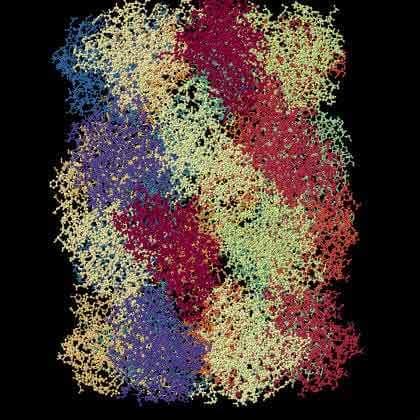Key Points
- Before the development of Velcade®, there was no effective treatment for multiple myeloma (MM)—a blood cancer that is estimated to claim over 10,000 lives in the United States each year.
- Velcade® is the first drug of its kind in a new class of anticancer drugs called proteasome inhibitors.
- A collaboration between the National Cancer Institute (NCI) and ProScript, a biotech company, led to the initial clinical trial of Velcade® and to approval by the Food and Drug Administration (FDA) for treatment of MM.
- Today, patients diagnosed with MM live longer because of the availability of new drugs like Velcade®. MM is now treated as more of a chronic disease.
Pathway to Discovery
Velcade® (bortezomib), originally known as PS-341, was first developed by ProScript, a biotech company, to treat muscle weakness and muscle loss associated with AIDS and muscular dystrophy (a group of more than 30 inherited diseases that cause muscle weakness and muscle loss). Julian Adams, Ph.D., a ProScript chemist, realized that the use of PS-341 to treat muscle loss was still further down the research road. Instead, Dr. Adams proposed its use as an anticancer drug.
New thinking spurs development of a new class of anticancer drugs. In the mid-1990s, scientists found that a large protein complex, known as a proteasome, was necessary for cell survival and growth. The proteasome is found in all cells. It works like a cell's garbage disposal system by eliminating unnecessary, extra, or damaged proteins.
Dr. Adams had a new idea. If the proteasome was responsible for eliminating damaged or harmful proteins in the cell, it might also be removing beneficial ones. Dr. Adams thought that since PS-341 slows down the action of the proteasome, it might also slow down the destruction of key proteins that help cells fight off cancer. This new approach to destroying cancer helped to develop an entirely new class of anticancer drugs called proteasome inhibitors. He and his fellow scientists at ProScript continued to refine PS-341 as a proteasome inhibitor that was highly specific and effective enough to block the activity of the proteasome.
To help develop PS-341 as an anticancer drug, Dr. Adams reached out to the National Cancer Institute (NCI) to see if the drug could be effective in a variety of cancer cell lines. Researchers found that PS-341 significantly reduced cell growth in many different types of cancer cells.
Early on in its development no one believed in the molecule, or the target! I…forged a formidable alliance with the National Cancer Institute…under the guidance of Edward Sausville at the NCI, we kept building the evidence for a case to see Velcade® through.
Multiple myeloma becomes a good target. ProScript and NCI scientists then tested PS-341 in mice that were given certain types of cancer. The results showed that tumors shrank by 60 percent when the drug was given intravenously and shrank by 70 percent when it was injected directly into the tumor. At the end of the study, 40 percent of the mice had no detectable tumor. These findings and those from other NCI-supported studies suggested that multiple myeloma (MM) might be a good target for PS-341.
MM damages the bone marrow as a result of uncontrolled production of plasma cells, a type of white blood cell. These abnormal plasma cells stimulate the breakdown of actively used bones such as the spine, pelvis, and bones around the shoulders and hips. This can cause extreme pain. Prior to the development of Velcade®, no effective treatment options were available for MM.
The potential role of PS-341 in cancer treatment of MM was exciting - Dr. Adams, along with NCI -supported Kenneth Anderson, MD, an expert on MM working with Dana Farber Cancer Institute, continued to champion use of the drug. In 2000, in a phase I clinical trial, while giving a very low dose of PS-341 to a patient with multiple myeloma to test for safety, researchers were stunned to find that the patient's cancer went into complete remission.
Based on these results, Millennium Pharmaceuticals, which became the proprietor of PS-341, became fully committed to seeing the drug through clinical trials. PS-341 was then tested at seven cancer centers across the United States. Millennium conducted three of the studies and an additional four studies were sponsored by NCI. The results confirmed that the drug was effective.
The Millennium–Dana-Farber collaborative preclinical study found that PS-341 inhibited MM cell growth and induced cell death. The study also found that, in patients where previous treatments had not worked, those treatments would work when patients were first treated with Velcade®.
In early 2001, PS-341 moved into phase II trials in patients with MM, showing encouraging results. Paul Richardson, M.D., director of the Velcade® studies at Dana-Farber, explained to the Boston Globe that Velcade®, along with subsequent drugs developed for MM, have helped turn MM from ''a great white shark of an illness to more of a chronic disease'' like diabetes.
Promising research leads to rapid development and review. Based on these promising study findings and the fact that MM patients often developed resistance to the other treatments that were available at the time, the FDA granted rapid development and review of PS-341 for MM. In 2003, PS-341 was approved by the FDA to treat MM and was branded with the official name bortezomib (Velcade®). The drug was initially approved only for patients whose cancer did not respond to conventional treatments or came back after initially responding to treatment. Velcade®'s success, however, eventually led to its being approved for patients newly diagnosed with MM.
Enhancing Cancer Care
Patients diagnosed with MM are living longer than those diagnosed 10 years ago because of the availability of new drugs like Velcade®. Several clinical studies have shown that Velcade® is even more effective when used in combination with two, three, or four other anticancer drugs in patients newly diagnosed with MM. This treatment plan has become the standard of care.
In a three-drug study, 85 percent of patients responded well to the treatment plan and 40 percent of patients experienced remission after one to two years. Similar success was achieved with a four-drug combination—96 percent of patients responded to the treatment and 39 percent went into remission. Patients who are able to receive more than four cycles of three- and four-drug treatment have an even greater response to the combination treatment with Velcade®.
Turning Discovery into Health
Proteasome inhibitors in the treatment of MM have seen success, but there have been challenges as well. Unpleasant side effects and tumor cell resistance, for example, have been observed in patients taking Velcade® for extended periods. The most commonly reported side effects are damage to peripheral nervous system (parts of the nervous system outside the brain and spinal cord); peripheral neuropathy (nerve problems); anemia (low red blood cell count); tiredness; low white blood cell count; and low platelet cell count.
Scientists and clinicians are looking at whether different ways of administering Velcade® can help reduce neuropathy. In clinical trials, compared with the established intravenous method, giving Velcade® underneath the skin (subcutaneously) showed a significant decrease in the incidence (the number of new cases) of peripheral neuropathy and is comparably effective in treating MM. Consequently, a treatment plan that includes giving Velcade® subcutaneously in combination with lenalidomide and dexamethasone has been approved for patients with preexisting neuropathy or who are at risk for neuropathy.
Following a greater understanding of proteasome inhibition with Velcade® in the treatment of MM, a new generation of these drugs is now in clinical development. The results of ongoing studies will provide valuable information about including them in current MM treatment plans and could help patients who have become resistant to Velcade®. Because Velcade® has shown such promise, it is now being studied for use in a wide variety of blood cancers and solid tumors.
Research to Practice: NCI's Role
The discovery of Velcade® for the treatment of MM originated from a collaboration with ProScript Inc. and NCI scientists, Drs. Edward A. Sausville and Jill Johnson from the Division of Cancer Treatment and Diagnosis, Developmental Therapeutics Program. NCI has supported and continues to fund research on the structural and biochemical complexities of the proteasome, as well as clinical trials on Velcade® and various drug combinations.
Key Takeaway
Before the development of Velcade®, there was no effective treatment for multiple myeloma (MM). Today, patients diagnosed with MM live longer than those diagnosed 10 years ago. Thanks to support by NCI, scientists developed a new class of anticancer drugs whose potential in the fight against cancer continues to be explored.
Selected Resources
Adams J, Palombella VJ, Sausville EA, et al. Proteasome inhibitors: A novel class of potent and effective antitumor agents. Can Res. 1999;59(11):2615-2622. [PubMed Abstract]
Elliott PJ, Ross JS. The proteasome: A new target for novel drug therapies. Am J Clin Pathol. 2001;116(5);637-646. [PubMed Abstract]
Hideshima T, Richardson P, Chauhan D, et al. The proteasome inhibitor PS-341 inhibits growth, induces apoptosis, and overcomes drug resistance in human multiple myeloma cells. Cancer Res. 2001;61(7):3071-3076. [PubMed Abstract]
Jagannath S, Barlogie B, Berenson J, et al. A phase 2 study of two doses of bortezomib in relapsed or refractory myeloma. Br J Haematol. 2004;127(2):165-172. [PubMed Abstract]
Jakubowiak AJ, Griffith KA, Reece DE, et al. Lenlidomide, bortezomib, pegylated liposomal doxirubicin, and dexamethasone in newly diagnosed multiple myeloma: a phase 1/2 multiple Myeloma Research Consortium Trial. Blood. 2011;118(3):535-543. [PubMed Central]
Jakubowiak AJ, Kendall T, Al-Zoubi A, et al. Phase II trial of combination therapy with bortezomib, pegylated liposomal doxirubicin, and dexamethasone in patients with newly diagnosed myeloma. J Clin Oncol. 2009;27(30):5015-5022.[PubMed Abstract]
Richardson PG, Barlogie B, Berenson J, et al. A phase 2 study of bortezomib in relapsed, refractory myeloma. N Engl J Med. 2003;348(26):2609-2617. [PubMed Abstract]
U.S. National Library of Medicine and the National Institutes of Health. Drug Information Portal: Velcade®. 2014.
U.S. National Library of Medicine and the National Institutes of Health. MedlinePlus. Multiple myeloma. 2014.

